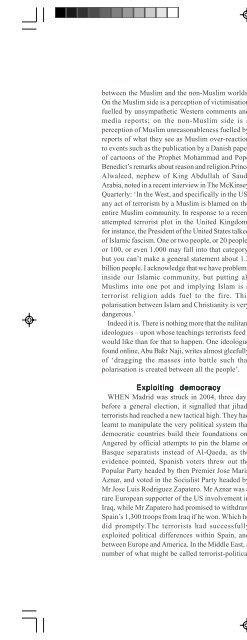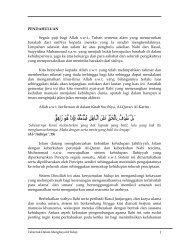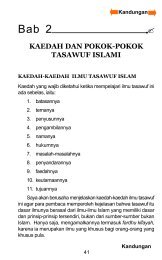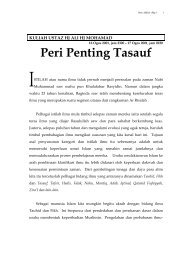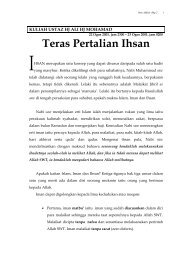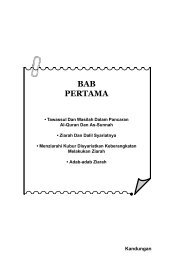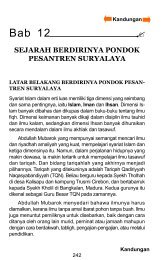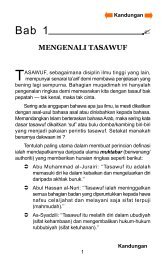inab3 cover front.psd - Khadijah Mosque
inab3 cover front.psd - Khadijah Mosque
inab3 cover front.psd - Khadijah Mosque
You also want an ePaper? Increase the reach of your titles
YUMPU automatically turns print PDFs into web optimized ePapers that Google loves.
etween the Muslim and the non-Muslim worlds.<br />
On the Muslim side is a perception of victimisation<br />
fuelled by unsympathetic Western comments and<br />
media reports; on the non-Muslim side is a<br />
perception of Muslim unreasonableness fuelled by<br />
reports of what they see as Muslim over-reaction<br />
to events such as the publication by a Danish paper<br />
of cartoons of the Prophet Mohammad and Pope<br />
Benedict’s remarks about reason and religion.Prince<br />
Alwaleed, nephew of King Abdullah of Saudi<br />
Arabia, noted in a recent interview in The McKinsey<br />
Quarterly: ‘In the West, and specifically in the US,<br />
any act of terrorism by a Muslim is blamed on the<br />
entire Muslim community. In response to a recent<br />
attempted terrorist plot in the United Kingdom,<br />
for instance, the President of the United States talked<br />
of Islamic fascism. One or two people, or 20 people,<br />
or 100, or even 1,000 may fall into that category,<br />
but you can’t make a general statement about 1.3<br />
billion people. I acknowledge that we have problems<br />
inside our Islamic community, but putting all<br />
Muslims into one pot and implying Islam is a<br />
terrorist religion adds fuel to the fire. This<br />
polarisation between Islam and Christianity is very<br />
dangerous.’<br />
Indeed it is. There is nothing more that the militant<br />
ideologues – upon whose teachings terrorists feed -<br />
would like than for that to happen. One ideologue<br />
found online, Abu Bakr Naji, writes almost gleefully<br />
of ‘dragging the masses into battle such that<br />
polarisation is created between all the people’.<br />
Exploiting democracy<br />
WHEN Madrid was struck in 2004, three days<br />
before a general election, it signalled that jihadi<br />
terrorists had reached a new tactical high. They had<br />
learnt to manipulate the very political system that<br />
democratic countries build their foundations on.<br />
Angered by official attempts to pin the blame on<br />
Basque separatists instead of Al-Qaeda, as the<br />
evidence pointed, Spanish voters threw out the<br />
Popular Party headed by then Premier Jose Maria<br />
Aznar, and voted in the Socialist Party headed by<br />
Mr Jose Luis Rodriguez Zapatero. Mr Aznar was a<br />
rare European supporter of the US involvement in<br />
Iraq, while Mr Zapatero had promised to withdraw<br />
Spain’s 1,300 troops from Iraq if he won. Which he<br />
did promptly.The terrorists had successfully<br />
exploited political differences within Spain, and<br />
between Europe and America. In the Middle East, a<br />
number of what might be called terrorist-political<br />
organisations have exploited democracy in a<br />
different way, by taking part in elections and<br />
winning seats in government. The Muslim<br />
Brotherhood in Egypt, Hizbollah in Lebanon and<br />
Hamas in the Palestinian territories are prime<br />
examples.<br />
The long-term implications of this trend are far<br />
from clear. To be optimistic, the responsibilities of<br />
formal power might temper their violent tendencies<br />
and moderate them into ‘normal’ political parties<br />
which seek power through constitutional means.<br />
To be pessimistic, their new positions will allow<br />
them to spread their influence and subvert the<br />
system from within. One can expect the rise of<br />
subconventional warfare between these groups and<br />
the governments they seek to unseat. And they are<br />
not confined to national boundaries: Their links<br />
and influence cut across borders. Taken together,<br />
Hamas, Hizbollah and the Muslim Brotherhood<br />
mark the rise of non-state actors as players in the<br />
Middle East. This is a new challenge to the power<br />
balance in the region, dominated traditionally by<br />
Saudi Arabia, Egypt, Syria and Iraq.<br />
In sync<br />
SO, THE shadow of today’s terrorism threat is<br />
indeed a very long one. It spans the globe, touching<br />
myriad local communities, including Singapore’s.<br />
In the 1960s and 1970s, the Singapore government<br />
had a programme to inoculate Singaporeans against<br />
communist ideology. Many organisations were<br />
called into action - from schools to the People’s<br />
Association to business groups. Today, we have a<br />
roughly similar, although probably not as concerted,<br />
programme via the Religious Rehabilitation Group,<br />
the Community Engagement Programme and Interracial<br />
Confidence Circles.But today’s terrorist threat<br />
is more complex and delicate. In the Middle East, it<br />
is complicated by interplay with nationalist and<br />
political factors. In most other countries, including<br />
Singapore, it is complicated by communal and<br />
religious factors. Countering the jihadist threat, if<br />
done clumsily and with racial or religious prejudices,<br />
risks alienating entire Muslim communities and<br />
widening racial fault lines.<br />
To counter the threat effectively, it is necessary<br />
for many things to be in sync - every national policy,<br />
every government action, every arm of government,<br />
every national media, every private organisation<br />
that might unwittingly host a potential terrorist. It<br />
is a tall order, but that is the only way - if the long<br />
shadow of terrorism is not to grow.<br />
Masjid <strong>Khadijah</strong> 13


